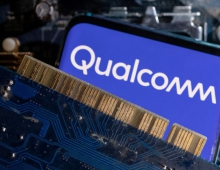
European Antitrust Regulators Accuse Qualcomm Of Abusing Its Position in Chip Market
The European Commission has informed Qualcomm of its preliminary conclusions that the company may have illegally paid a major customer for exclusively using its chipsets and sold chipsets below cost with the aim of forcing a competitor out of the market. The first Statement of Objections outlines that since 2011, Qualcomm has paid significant amounts to a major smartphone and tablet manufacturer on condition that it exclusively use Qualcomm baseband chipsets in its smartphones and tablets. The Commission takes the preliminary view that this conduct has reduced the manufacturer's incentives to source chipsets from Qualcomm's competitors and has harmed competition and innovation in the markets for UMTS and LTE baseband chipsets. The contract between Qualcomm and the manufacturer containing the exclusivity clauses is still in force.
The second Statement of Objections takes the preliminary view that between 2009 and 2011 Qualcomm engaged in 'predatory pricing' by selling certain baseband chipsets at prices below costs, with the intention of hindering competition in the market. This conduct appears to have taken place at a time when Icera posed a growing threat to Qualcomm in the leading edge segment of the market, offering advanced data rate performance. In the Commission's preliminary view, Qualcomm reacted to that threat by selling certain quantities of its UMTS baseband chipsets to two of its customers at prices that did not cover Qualcomm's costs, with the aim of forcing Icera out of the market.
A Statement of Objections informs the subject of the investigation of the allegations against it and provides an opportunity to respond to such allegations. It is not a determination of the final outcome of the investigation.
Qualcomm now has the opportunity to respond to the Commission's allegations outlined in the Statements of Objections within 3 months as regards the exclusivity payment objections and 4 months as regards the predatory pricing objections, and to ask for an oral hearing in each case.
"Qualcomm has been cooperating with the Commission since the outset of these matters, and now that we've received the Statements of Objections, we welcome the chance to formally respond," said Qualcomm general counsel and executive vice president, Don Rosenberg. "We look forward to demonstrating that competition in the sale of wireless chips has been and remains strong and dynamic, and that Qualcomm's sales practices have always complied with European competition law."
Separately, the Taiwan Fair Trade Commission (TFTC) has requested information from Qualcomm, and has initiated an investigation into whether the company's patent licensing arrangements violate the Taiwan Fair Trade Act.





















